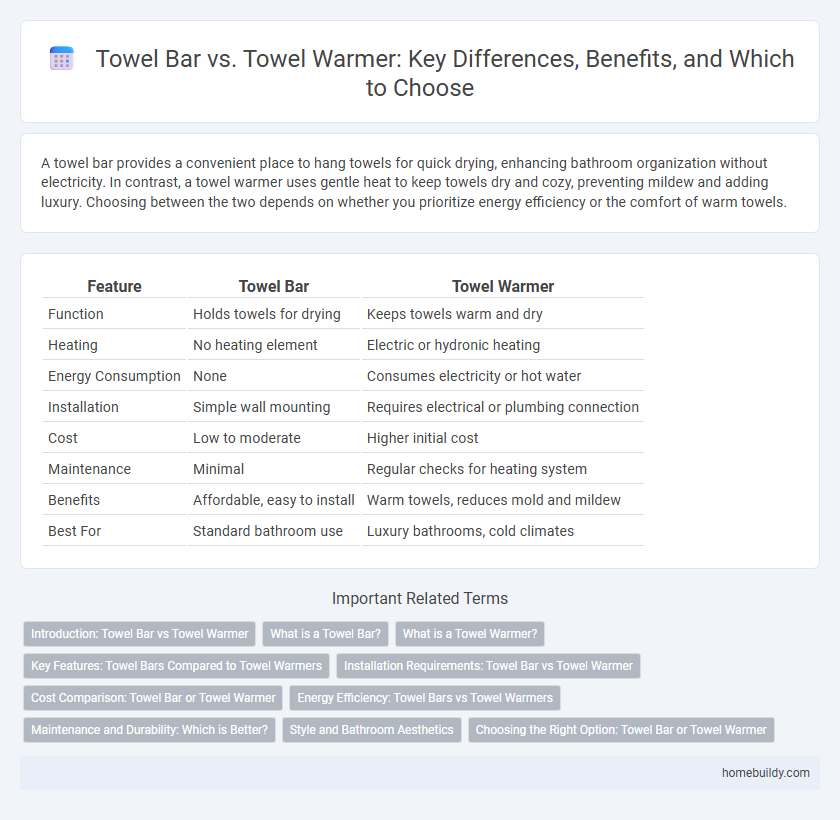A towel bar provides a convenient place to hang towels for quick drying, enhancing bathroom organization without electricity. In contrast, a towel warmer uses gentle heat to keep towels dry and cozy, preventing mildew and adding luxury. Choosing between the two depends on whether you prioritize energy efficiency or the comfort of warm towels.
Table of Comparison
| Feature | Towel Bar | Towel Warmer |
|---|---|---|
| Function | Holds towels for drying | Keeps towels warm and dry |
| Heating | No heating element | Electric or hydronic heating |
| Energy Consumption | None | Consumes electricity or hot water |
| Installation | Simple wall mounting | Requires electrical or plumbing connection |
| Cost | Low to moderate | Higher initial cost |
| Maintenance | Minimal | Regular checks for heating system |
| Benefits | Affordable, easy to install | Warm towels, reduces mold and mildew |
| Best For | Standard bathroom use | Luxury bathrooms, cold climates |
Introduction: Towel Bar vs Towel Warmer
Towel bars provide a simple, practical solution for hanging towels, offering easy access and quick drying through air circulation. Towel warmers enhance comfort by gently heating towels, promoting faster drying and reducing mildew growth, with options ranging from electric to hydronic models. Choosing between a towel bar and a towel warmer depends on preferences for functionality, energy use, and bathroom ambiance.
What is a Towel Bar?
A towel bar is a wall-mounted fixture designed to hold and dry towels, typically made from materials like stainless steel, aluminum, or brass for durability and resistance to moisture. Unlike towel warmers, towel bars do not generate heat but provide a convenient and hygienic way to hang towels, allowing air to circulate and facilitate natural drying. Towel bars come in various lengths and styles, fitting different bathroom sizes while complementing decor with finishes such as chrome, matte black, or brushed nickel.
What is a Towel Warmer?
A towel warmer is an electrical or hydronic device designed to heat towels, providing a luxurious, warm drying experience and reducing moisture buildup that can lead to mildew. Unlike a towel bar, which serves only as a horizontal rod for hanging towels, a towel warmer combines functionality with comfort by maintaining an optimal temperature. Popular in bathrooms and spas, towel warmers enhance hygiene and add a touch of sophistication to daily routines.
Key Features: Towel Bars Compared to Towel Warmers
Towel bars provide a simple, cost-effective solution for hanging towels and allowing them to air dry, focusing on functionality and ease of installation. Towel warmers, in contrast, incorporate heating elements that actively dry and warm towels, offering added comfort and reducing mildew risk through consistent heat. While towel bars prioritize durability and design versatility, towel warmers emphasize enhanced user experience and rapid towel drying capabilities.
Installation Requirements: Towel Bar vs Towel Warmer
Towel bars require minimal installation, typically needing basic wall mounting with screws and anchors, making them suitable for most bathroom setups without electrical work. Towel warmers, however, often demand electrical wiring or hardwiring into the home's power supply, requiring a dedicated circuit and sometimes professional electrician installation to ensure safety and compliance with local electrical codes. Proper consideration of installation complexity and costs is essential when choosing between the simple setup of a towel bar and the more involved requirements of a towel warmer.
Cost Comparison: Towel Bar or Towel Warmer
Towel bars typically cost between $15 and $100, making them an affordable option for hanging towels without added features. Towel warmers range from $100 to $500 or more, reflecting their heating mechanism and added convenience. Choosing between the two depends on budget constraints and the desire for functionality beyond simple towel storage.
Energy Efficiency: Towel Bars vs Towel Warmers
Towel bars provide a passive, energy-free solution for drying towels by allowing air circulation, making them highly energy-efficient. Towel warmers, while consuming electricity to actively heat towels, increase energy usage but offer the benefit of quicker drying and added warmth in bathrooms. Choosing between the two depends on balancing energy consumption concerns with the desire for enhanced towel comfort and reduced drying time.
Maintenance and Durability: Which is Better?
Towel bars require minimal maintenance, typically needing occasional cleaning to prevent rust or corrosion, making them a durable choice for long-term use. Towel warmers, while providing added comfort by heating towels, demand more maintenance due to electrical components and potential wear over time. In terms of durability, towel bars generally outlast towel warmers, especially in humid bathroom environments where electrical parts may degrade faster.
Style and Bathroom Aesthetics
Towel bars offer a sleek, minimalist design that complements modern bathroom aesthetics with simplicity and subtle elegance. Towel warmers, often bulkier and equipped with heating elements, add a touch of luxury and sophistication while serving a functional purpose of warming towels. Choosing between the two depends on balancing style preferences with the desired level of comfort and ambiance enhancement in the bathroom.
Choosing the Right Option: Towel Bar or Towel Warmer
Towel bars provide a simple and cost-effective solution for hanging towels, offering quick drying through airflow but without added warmth. Towel warmers enhance comfort by gently heating towels, reducing dampness and bacteria, ideal for cold climates or frequent use. Selecting between a towel bar and a towel warmer depends on budget, bathroom size, and desired functionality, with towel warmers requiring electrical installation while towel bars remain low-maintenance.
Towel bar vs Towel warmer Infographic

 homebuildy.com
homebuildy.com